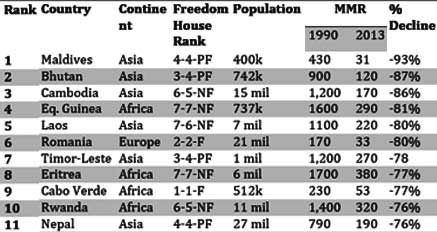When Even Good News Is Given A Shrug
![]()
On behalf of myself and all awatistas (whether you like it or not), I would like to congratulate Nigerians and Ghanians for waking up one Monday morning (let’s assume it was Monday) and learning that they no longer belong to the dreaded “low income” country but the up-and-coming “low middle income” country. Yay! Please join me in giving a special shout-out to Nigeria which surpassed South Africa to become Africa’s largest economy. This must have meant quite a lot to the Ghanian president who ran on a platform of improving the livelihood of Ghanians. Of course, cynics among you are going to ruin it all for us and say that this had nothing to do with prudent fiscal/monetary policies but an abrupt change in the way that Gross Domestic Product (GDP) is calculated. The cynics would be right. This week, the World Health Organization (WHO) announced Maternal Mortality Ratios (MMR) and Eritrea was in the top 10 countries in reducing MMRs. The ordinary Nigerian, Ghanian and Eritrean have shrugged off this “good news.” Why?
1. Gross Domestic Product (GDP)
There have been a number of books and journals from scholars bemoaning the lack of reliable statistics on Africa, particularly after the Ghana (2010) and Nigeria (2013) GDP jumps. This started a domino effect with other African countries lining up for adjustment to their GDP (Ethiopia, where are you?) and the IMF/World Bank taking a skeptical look. Of course, when you move from “low income” to “low middle income” category, you lose some concessions like favorable interest rates, so some Africans are not incentivized to adjust their GDP upward, even if the math says they should.
Those of you who have taken econ in college and still remember it (without cheating and going to econport.org, like I did) may want to skip this section or treat it as a refresher. For the rest of us, there are two ways to define and calculate GDP: the expenditure approach and the income approach. The two should give you the same number because one man’s expenditure is another man’s income. (Please notice I did NOT say one woman’s expenditure… because I am not sexist.)
The Expenditure approach says that a nation’s GDP is the sum of four expenditures:
1. Private Consumption (C ): Goods and services purchased by households.
2. Private Investment (I): Machinery investment, increase in inventory, home purchases;
3. Government Purchases (G): Goods and services purchased by government. This does NOT include transfer payments that the lefties love (welfare, social security, etc)
4. Net Exports (X – M): exports minus imports
If you use this approach to calculating GDP in Africa, you are stuck with a lot of problems. How does one quantify and qualify goods and services purchased by households in an economy where there is contraband and bartering? You can’t quantify and qualify increase in inventory where inventory is hidden to minimize taxation because the tax collectors in Africa use the eyeball methodology when assessing tax: “beautiful and fully-stocked store you got there; it would be a shame if something were to happen to it!” ) Government purchases that require hard currency are easy to track (assuming they are not “national secrets” that can’t be shared): but what about off-the-book purchases like the ones that are common in Eritrea? Finally, net exports depend on a customs office with sterling record keeping, which Africa is solely lacking.
The Income approach says that a nation’s GDP is the sum of four incomes:
1. Labor Income (W): Salaries, wages, fringe benefits and transfer payments (social security, welfare, etc.)
2. Rental Income (R ): income from rental of households, as well as income from royalties, patents and copyrights.
3. Interest income (I): household incomes derived from lending money to government and companies
4. Profits (P): company profits (more accurately, “accounting profit”, add back depreciation and indirect business taxes)
Here, too, you have the same problems. The labor income most likely does not count the cash-market: it probably only counts actual salaries. Rental income: to evade taxes, there are side-side deals, tax transactions that the statisticians can only estimate. Interest income is negligible: Forget lending to government: Africans are loathe to keep their money in the bank fearing the confiscatory and coup-prone governments. As for company profits—we have a problem at the top line (quantifying revenues) and the middle line (quantifying expenses), never mind the depreciation and business taxes.
In short, when aggregating the numbers, regardless of what methodology is used, the statistician is faced with a challenge at every level.
This assumes there is a statistician: in much of Africa, the statistics department is one person, who is often lent out to other departments.
When it comes to GDPs, the focus is on GDP growth or decline, that is, it is a relative measure on whether the country’s economy is getting better or worse. Because the comparison is done using “constant dollars”, a base year is required for calculation. The base year is supposed to be one when the country collected a lot of data on its economy. The downside to this is that if the base year is ancient, it may be over-counting sectors of the economy that are no longer dynamic and/or it may be understating sectors of the economy that didn’t exist when the base year was established (telecommunication, smart phones, etc.) The World Bank/IMF recommends that the base year be changed every five years; in Africa, many countries are using 20 years-ago as a base year. Nigeria was using 1990; Ghana was using 1993.
In short, the sudden shift in Ghana and Nigeria GDP’s growth is attributed to changing the base year. Cynics, rejoice. Well, cynics never rejoice. For more on this, you can read Morten Jerven’s book: “Poor Numbers: How We Are Misled by African Development Statistics and What to Do about It” or his article: http://www.theguardian.com/business/2012/nov/20/economics-ghana
2. GDP Per Capita
Of course, GDP, even when accurate, is an incomplete report—as I keep reminding my Ethiopian friends who are celebrating their country’s status as one of Africa’s biggest economies. The one that matters is GDP per capita. This is because GDP growth is meaningless if it is not keeping up with population growth. But GDP Per Capita is even harder to depend upon because African governments are notoriously unreliable when it comes to taking a census.
This (dearth of statistics) is actually one of the most surprising things about the Eritrean government. Surprising because the EPLF was famous for its data gathering and crunching (locally referred to as Ornek.) If you are skeptical about this, you may want to refer to:
(1) the “Martyr’s Database”, a report that was smuggled out and published by awate and asmarino. The part we published is a small fraction of the data that was gathered. Our decision to withhold the info was for national security purposes but it was ominously interpreted later on by our friend Yosief Ghebrehiwet as “awate the anesthesiologist conspiring with the Eritrean government in the extinction of Bhere Tigrinya)”;
(2) “Eritrea: Its Land and People”, a report that was smuggled out and published by awate. The details are impressive: the government had broken down the population to the hamlet/ qushet level.
(3) There are also reports published by students working on their dissertations who have used private (non-published) reports that still indicate that the government is collecting census data. A good example of this is a paper published by Yonas Tesfamariam Bahta and Berhane Okubay Haile (University of the Free State, South Africa), entitled: “DETERMINANTS OF POVERTY OF ZOBA MAEKEL OF ERITREA: A HOUSEHOLD LEVEL ANALYSIS.” The two relied on a 2008 census (never published, of course), which breaks down the population of “Zoba Maekel,” by household, down to every village.
Occasionally, if not rarely, there are genuine national security questions to withhold information. More often than not, when governments do not release statistics, it is either because there is something unflattering about them or, in the case of the PFDJ which has always seen itself as a vanguard guiding us and protecting us from demagogues, because “gziu aykonen.” The way they think: if we give them the data, somebody is going to sit down and compare the population of Maekel with Debub and Gash Barka and demagogue it. In other words, it is all our fault that there is no census about Eritrea published for 60 years! Plus, according to the government, all statistics are bad and unreliable—unless they tell the world how great we are, in which case, by all means, publicize away. When The Economist published a report about how Eritrea’s economy will be one of the fastest in the world, Yemane Gebremeskel tweeted a supporter to congratulate him for a job well done in publicizing this wonderful news which (in its executive summary) added a qualifier: we think the government will mismanage it anyway and we don’t expect this to trickle down to the people. Oh well.
Going to our friends, the Ghanians and the Nigerians, while the sudden doubling of their GDP may have pleased the political class, it meant nothing to the average person and was, therefore, shrugged away.
3. WHO and Maternal Mortality Ratio
The World Health Organization (WHO) just issued its annual report. I like WHO because it is one of the few international organizations that issue country reports that are not telling us that the world is going to hell in a hand basket. Its reports are always “things are getting better and here are some countries that are really, really doing well.” At some point, WHO is going to be like the March of Dimes, making itself extinct because its mission is complete. (March of Dimes was fighting polio and that malady is largely defeated.) In the meantime, WHO is like all GOs and NGOs, unable to resist the need to create urgency: it its press release, it said that global maternal mortality rates are the same as having two plane crashes with 100% fatality every day. Well. You can read its report here:
http://apps.who.int/iris/bitstream/10665/112682/2/9789241507226_eng.pdf?ua=1
Before we get to the report card, let’s see the definition of Maternal Mortality Ratio or MMR. Maternal mortality ratio is defined as “maternal deaths per 100,000 live births.” Just to confuse us, WHO also reports the Maternal Mortality Rate (MMRate), which is defined as “the number of maternal deaths in a population divided by the number of women aged 15–49 years (or woman-years lived at ages 15–49 years.)” Of the two, the more dramatic one is the MMR, probably because it is the one that is included in the UN’s Millenium Development Goals (MDG). Specifically, countries have a target of reducing the MMR by 75% between 1990 and 2015.
The 11 Best Performing Countries
I have taken the 11 best performing countries (in terms of reducing the MMR by 75% or more) and added additional data to see if we can find co-relation. The additional variables are continent, governance, and population size.
I added continent only because the press reports I saw said that most of the top performing countries are in Asia (sending us Africans some subliminal message) and, of course, the press reports are, as you will see below, overstated.
I added governance because that’s really the debate between the “We Are On The Right Track” and the “We Are On The Wrong Track” Eritrean political groups. I chose Freedom House’s ranking system because they have been issuing country reports long before it was cool to do so (close to 40 years and, therefore, they are reliable). Freedom House gives a 1-7 rank on Freedom and Civil Liberties (1=best; 7=worst) and then uses this to classify a country as: Free (F), Partly Free (PF) or Not Free (NF.) In short, I included governance to try to see if there is a meaningful relationship between the freedom/liberty citizens enjoy and improvements in their MMR. (Hint: Cuba had answered this question decades ago: authoritarian governments are good at things that require rallying people, soldier like, to a cause.)
Finally, I included population size because, when the report of the Top 11 countries was given, I noticed that it included nations that are tiny. This makes intuitive sense: in statistics, when you have a small denominator, the rate will swing dramatically with small changes in the numerator. Or, as a TV producer once told a guy with a show that is barely watched: “hey, the ratings for your show just came in. Congratulations! Your viewership has increased from diddley to diddley squat!”
Let’s look at WHO’s report card, modified to include the other variables:

Cautious Conclusions
Before you draw conclusions, remember the mad scientist who cut off the legs of a frog, one leg a time, each time followed by the order “Jump!” When the frog wouldn’t move he wrote in his log, “A curious phenomenon. It appears that frogs become deaf when you cut off their legs!”
Let’s put our Mad Scientist hat to look at the MMR correlations:
Mad Scientist 1: The best way to improve MMR is to convert your population to Islam because the best-performing country, Maldives, is a Muslim country. (The other countries on the list are exceptions)
Mad Scientist 2: You need authoritarianism, preferably dictatorship, the kind that will get you 7-7 NF rank in Freedom House, to get results follows. (Bhutan, Capo Verde, Nepal, Romania are exceptions.)
Mad Scientist 3: You need freedom and democracy to improve a nation’s MMR. (Eritrea, Laos, Equatorial Guinea and Rwanda are exceptions.)
Mad Scientist 4: Small countries register fastest improvement in their MMR. (Sao Tome, Belize, Guyana, Djibouti, Swazliland, Mauritius are exception.)
I don’t know what the reason for the impressive MMR is, but my position is: if true, it is great news that Eritrea has reduced its mortality rate because, at the end of the day, that is really what any government should be measured on: how are you improving the lives of your population? Of course, in a country where over 70% of births happen at home, (by the way: did you congratulate your midwife? May 5 was “International Day of the Midwife.”) one may be skeptical, but WHO factors this in.
But there is a reason why this good news is shrugged at by the people. If a mother’s life is spared, thanks to your policies, but if this same woman was chased out of her own country thanks to your policies and drowned in the Mediterranean, don’t expect the people to thank you for your governance. It reminds me of an Amharic song that still wakes me up in cold sweat: yematreba fiyel zetegn tweldalech.…
Eritrea’s Economy
And what is the point of saving a life if you are going to enslave it? Unlike the field of health, economics depends on a lot of things that cannot be ordered: free people taking risks to get rewards. Enterprise. And how are we doing there?
Well, there is another report that comes out annually that, to me, is the true measure of whether Eritrea is making progress or lagging behind. That is the “Global Competitiveness Report” which is put out by World Economic Forum. It is supposed to tell you where each country ranks in terms of competitiveness which is, of course, the only way to improve a people’s standard of living. The Global Competitiveness Report came out in September 2013 and once again, Eritrea doesn’t not appear anywhere. I mean that literally: you can do a search command and type “Eritrea” in the 569-page and we are not there.
http://www3.weforum.org/docs/WEF_GlobalCompetitivenessReport_2013-14.pdf
All governments want to hide bad news and publicize good news. What we Africans are lacking are impartial, non-politicized offices that publish statistics—good or bad—whether it harms or supports the government. A good example is the unemployment rates that are published by the Labor Department on the last Friday of each month. Obviously, we don’t have the resources for that but we should make it a goal to have our Statistics office to be free from politics. Otherwise, we will be one of those countries that don’t agree on anything and have no common ground.
The Isaias Afwerki regime has lost the confidence of the Eritrean people because of a series of bone-headed and stubborn decisions. When confidence and trust is gone, even great news like the one issued by WHO about Eritrea’s MMR is treated with a shrug. And, for that, Isaias Afwerki has nobody to blame but himself.



Awate Forum